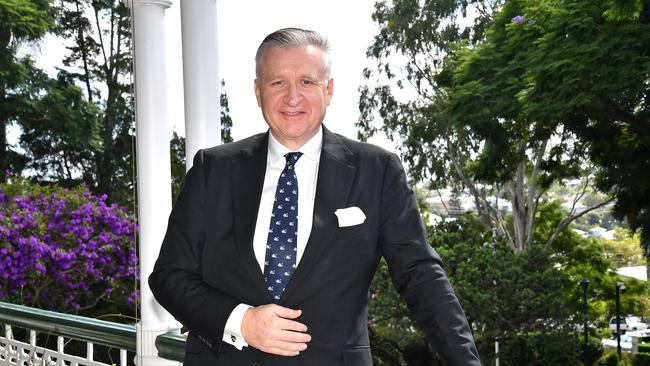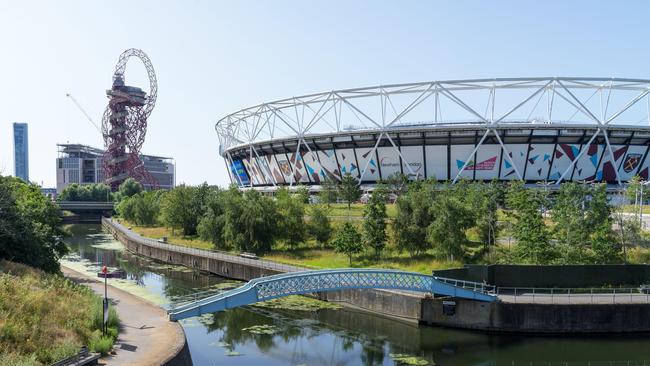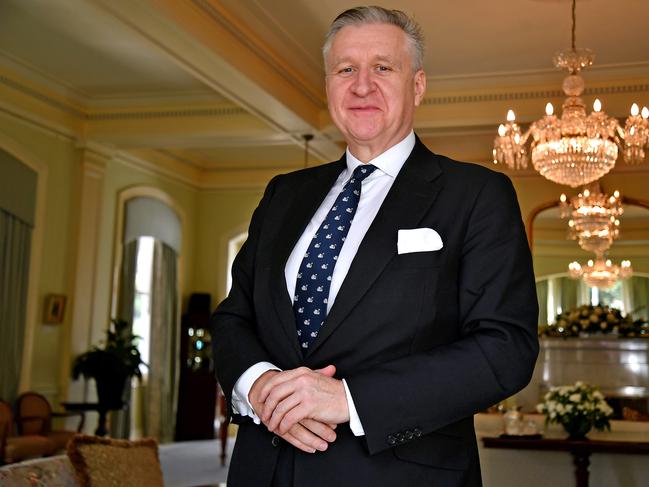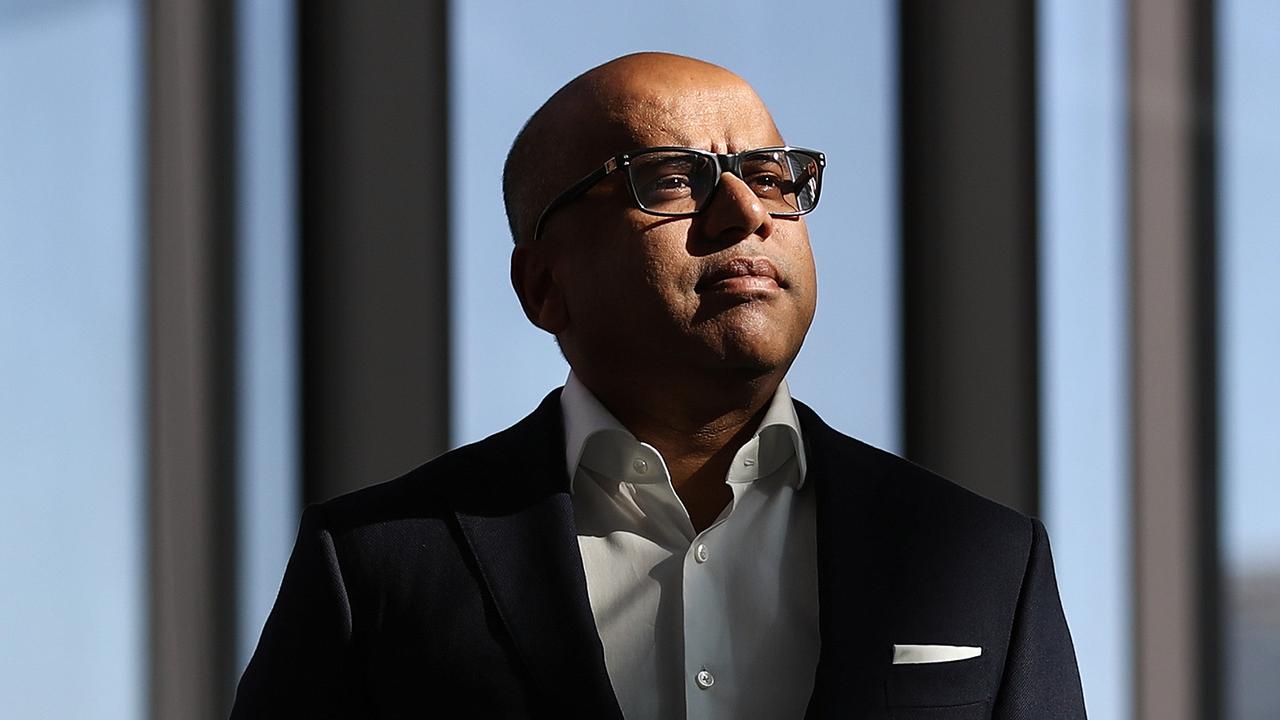City of London Lord Mayor Alastair King says Brisbane can unlock future with Olympics
London’s Lord Mayor says good planning can create long-term outcomes for Brisbane which would not have been possible without the upcoming Games.

City of London Lord Mayor Alastair King has presented London as a prime investment hub for Australian superannuation funds, arguing the British capital offers a secure environment amid global uncertainty from US President Donald Trump’s tariffs.
During his visit to Australia this week to meet with super fund and business leaders, Mr King said strategic planning for the 2032 Olympics by Brisbane could unlock similar long-term benefits which transformed London’s economy.
“The Olympics is about good planning. We had good investment into infrastructure, particularly public transport, which has had a lasting dividend over the decade and a half, having transformed the entire London economy,” he said.
“It’s a fantastic example as to how to do things not just for the Olympics but more broadly.”
London’s Olympic legacy focused on long-term city planning and infrastructure improvements. Investments in public transport, including new train lines and station upgrades, continue to benefit the city more than a decade later.
“The infrastructure built has attracted events and allowed us to do things that would never have happened without the Olympics or investing into public transport,” Mr King said.
One example is ABBA’s virtual concert residency at Queen Elizabeth Olympic Park, which Mr King cited as an event London would not have been able to host without the Olympics-driven redevelopment.

Queensland’s 2032 Olympics preparations have faced delays and indecision over venue locations and infrastructure projects. The government has debated for years whether to upgrade The Gabba for $2.7bn or build a new stadium precinct at Victoria Park for $3.4bn.
In March 2024, former Premier Steven Miles rejected both options, instead allocating $1.6bn to upgrade QSAC while using Suncorp Stadium for the opening and closing ceremonies. Current Premier David Crisafulli is conducting a 100-day review of the plan.
“The area that was home to London 2012 has become an incredibly vibrant part of London that is a destination and has done remarkably well in the years since. Britain did that extremely well by turning a poor area that wasn’t the easiest place to do business into something vibrant,” Mr King said.
Like Brisbane, London faced scepticism before the Games about costs and economic impact. However, Mr King argued public sentiment shifted once the event began.
“The Olympics will always attract critics because of the cost, but when the Games actually happen, it becomes difficult to find people who aren’t in favour of the event,” he said.
“The amount of people who volunteered and the visitors from around the world created an incredible sense of unity. It was a remarkable moment in the city’s history.”

Before the 2012 Olympics, Queen Elizabeth Olympic Park was largely an underdeveloped and industrial area in Stratford of East London consisting of abandoned warehouses and contaminated land which had been neglected for years.
The Olympics acted as a catalyst for regeneration, transforming the area into a vibrant mixed-use district with housing, parks, sports venues, and cultural attractions. It has London Stadium, West Ham’s training grounds, multiple railways station and Westfield Stratford, one of Europe’s largest shopping centres.
Mr King and a delegation of British businesses are in Australia this week to explore foreign direct investment opportunities with Australian super funds. The UK is particularly interested in learning from the Australian superannuation model as it works toward greater consolidation of its pension funds.
As the 696th person to hold the position of Lord Mayor, Mr. King emphasised London remains an unparalleled investment hub, offering attractive returns amid global volatility and US tariffs.
“There are very few places in the world where you can get high single-figure or low double-figure rates of return in a politically safe environment with good rule of law and on a sustainable basis,” he said.
He added that London often receives negative global coverage but insisted the city remains a leader in financial, professional, legal, and maritime services.

“In the UK, we are still absolutely world-class and the best in the world in so many of these sectors,” Mr King said.
Mr King said despite concerns over tariffs imposed by the US, trade flows would still circulate, presenting opportunities for global players. He pointed to London’s leadership in sustainable finance as a potential advantage over the US, should the US shift away from the movement.
“If New York and the American economy turn their backs on sustainable finance, London is happy to take on those mandates,” he said.
“Geopolitics and talk of tariffs play well into the City of London as an investment destination given we did rather well under the first Trump administration. It’s also not a zero-sum game in that if New York is winning, it doesn’t mean that London or Australia is losing.”
The City of London, known as the Square Mile, houses the London Stock Exchange and the Bank of England. Mr King wanted Australian super funds to invest in London’s dominant sectors, emphasising the city’s expertise in risk management through insurance giants like Lloyd’s.

“I want (the super funds) to know London is the most extraordinary place where all sorts of things are happening in relation to management of risk, allocation of capital to positive net present value projects. It’s a remarkable place to be,” he said.
“In a very risky environment out there in the world, to be able to have your risks mitigated through such a sophisticated and impressive market such as Lloyd’s is a fantastic opportunity, particularly when you have excellent rule of law and hundreds of years’ worth of history.”
The Lord Mayor’s role changes annually and each year the City’s global ambassador travels the world trying to drum up investment in London’s financial district, particularly in the financial services, legal and maritime sectors.
Mr King said he would be looking to take away lessons from the super fund model in Australia introduced by the Keating government in the 1990s as a model for the UK to follow.

“The system is impressive. While there has been some criticism, you effectively have 14 super funds in Australia. In contrast, the UK has 21,000 pension schemes,” he said.
Mr King said such fragmentation creates inefficiencies in retirement outcomes, adding the UK is beginning to see consolidation which could eventually lead to the formation of mega funds.
“We’re starting to see some consolidation in the sector that will take time, but hopefully lead to some mega funds down the track.”
Mr King’s visit reflects London’s broader push to strengthen financial ties with Australia, positioning the UK as a stable and high-yielding investment destination despite ongoing geopolitical and economic shifts.





